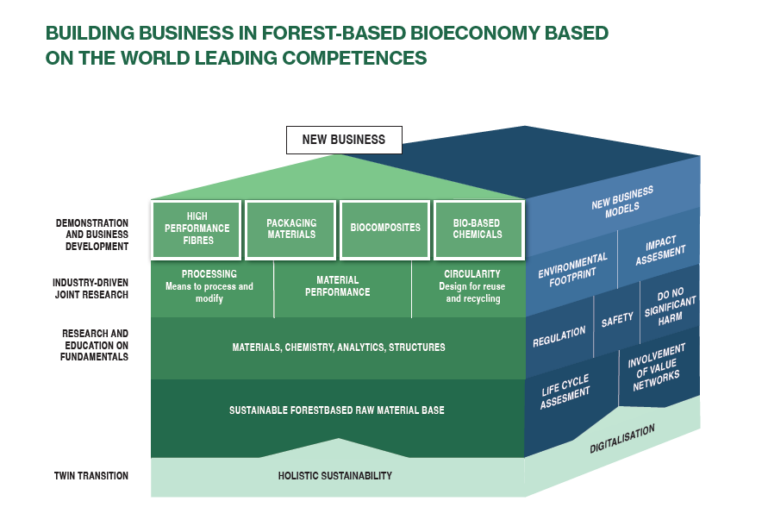At the heart of the SRIA’s renewal was a goal to update the understanding of holistic sustainability considerations and integrating digitalisation more concretely into R&D activities.
The SRIA presents in Figure 1. This strategic approach positions the forest-based bioeconomy at the forefront of the green transition, recognising the synergistic effects of sustainability and digitalisation in what is often referred to as a twin transition.
As the forest-based bioeconomy continues to evolve, data utilisation emerges as a tool for achieving the goals outlined in the SRIA. To attain carbon neutral products, it is essential to conduct new research encompassing the entire life cycle, including Life Cycle Assessment (LCA), carbon footprint analysis, and other analytical methods, alongside exploring carbon sequestration technologies.
In addition to expanding on digitalisation and sustainability, a review of recent national and European strategic publications was conducted to ensure alignment with contemporary industry advances.
The core components of joint research outlined in the SRIA continue in process development, improving the performance of materials and products, and research on the circular economy. The research initiatives aim to develop innovations related to high-quality fibre raw materials, packaging materials, biocomposites, and biochemicals.
“This SRIA gives an excellent frame to the RDI of new sustainable forest-based products and their production methods. In Finland, we want to continue to be forerunners in sustainable forest-based bioeconomy and for these strong collaborative R&D efforts exploiting modern tools such as digitalization in their full capacity are needed”, states Anna Suurnäkki, VP Research at Metsä Fibre.
In addition, the SRIA aligns with the United Nations’ sustainable development goals (including Goal 13 – Climate Action, and Goal 15 – Life on Land). This strategic alignment enhances the agenda’s effectiveness in addressing critical sustainability challenges.
Within innovation activities, the agenda continues to emphasise reducing carbon footprints, maximising the efficiency of biomass use, generating higher value, exploring the use of recycled raw materials, and considering comprehensive Life Cycle Assessment (LCA) throughout the product life cycle. Additionally, sustainable product design should encompass considerations for biodiversity, reflecting a holistic approach to environmental impact mitigation.
The SRIA further underscores the significance of research impact and exploitation, emphasising compatibility with do no significant harm principles and aligning with EU’s product environmental footprint methodology.
The agenda acknowledges challenges in the horizon, including a projected shortage of biomass availability on a European level. This SRIA underscores the importance of continued research and innovation to overcome the challenge and guide the forest-based bioeconomy towards a resilient future.
We are committed to work together and are actively inviting other stakeholders to join and participate in the activities that originate from this SRIA.
Read the full publication here
For more information, please contact:
Aila Maijanen aila.maijanen@clicinnovation.fi
Teija Vainio teija.vainio@clicinnovation.fi




